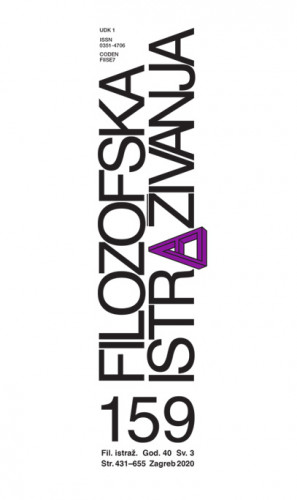U studijama o filmu pokazuje se prekretnim to što Deleuze sintetički povezuje rasklopljenu »bit« metafizike kao ontologije (bitak – bog – svijet – čovjek) s novim pristupom ne samo kretanju pojma, govoreći hegelovski, nego i mišljenju kao događaju. Isto još više vrijedi za razumijevanje onoga što traje u vremenu i stoga ima karakter misaone slike. Kako autor pokazuje u članku, Deleuze nju uspostavlja tako što mozak postaje ekran, a film iz sfere tzv. realiteta postaje virtualni kôd svijeta kao slike. Između koncepta i slike dokida se razlika kada slika više ne prethodi pojmu i kada pojam više ne prethodi slici. Koliko je ovaj obrat presudan za Deleuzeovo shvaćanje filma može se uočiti u izvedbi pojma događaja (événement). Slika i pojam odgovaraju singularnosti događaja. Problem s razumijevanjem Deleuzeove »ontologije slika« pokazuje da film ne možemo svesti na autonomnu proizvodnju kinematičkoga načina mišljenja ako prethodno ne razjasnimo što je to uopće pokret i kako nastaje slika. Film je u tom paradigmatskome slučaju ne samo »vizualni kôd« suvremene umjetnosti. Njegova se »bit« razotkriva u tome što omogućuje da slika-pokret i slika-vrijeme sintetički realiziraju mogućnosti tehnosfere kao: (1) računanja, (2) planiranja i (3) konstrukcije. Naposljetku, filmsko mišljenje koje Deleuze zagovara postaje pitanje o mogućnostima da film kao metafilm dosegne novu razinu filozofijskoga razmatranja onoga što postaje i nastaje novim sklopom odnosa između bitka i događaja.; In Deleuzeʼs studies on film, it is striking that the dismantled “essence” of metaphysics as an ontology (being – god – world – man) is synthetically linked with a new approach not only to the movement of the concept, speaking in Hegelʼs language but also to the thinking as an event. That is even more true for the understanding of that which lasts in time and thus has the character of the thought-image. As the author points out in this article, Deleuze establishes this by turning the brain into a screen, and the film from the sphere of the so-called reality becomes the virtual code of the world as an image. The difference between concept and image eliminates the difference between the image no longer preceding the term and the term no longer preceding the image. How crucial this turn will be to Deleuzeʼs notion of the cinema can be seen in the derivation of the concept of an event (événement). The image and term correspond to the singularity of the event. The problem with comprehending Deleuzeʼs “images-ontology” shows that film cannot be reduced to the autonomous production of a cinematic way of thinking unless we have previously clarified what movement is and how it is created. In this paradigmatic case, a cinema cannot be viewed simply as a “visual code” of contemporary art. Its “essence” is revealed in that it enables the image-movement and image-time to synthetically realize the possibilities of the technosphere as (1) computation, (2) planning and (3) construction. Eventually, the cinematic thinking advocated by Deleuze becomes a question of the possibility of film as a meta-film reaching a new level of philosophical consideration of what becomes and emerges with a new set of relations between Being and event.
Sažetak

 Filozofska istraživanja : 40,3(2020) / glavni i odgovorni urednik Ante Čović.
Filozofska istraživanja : 40,3(2020) / glavni i odgovorni urednik Ante Čović.